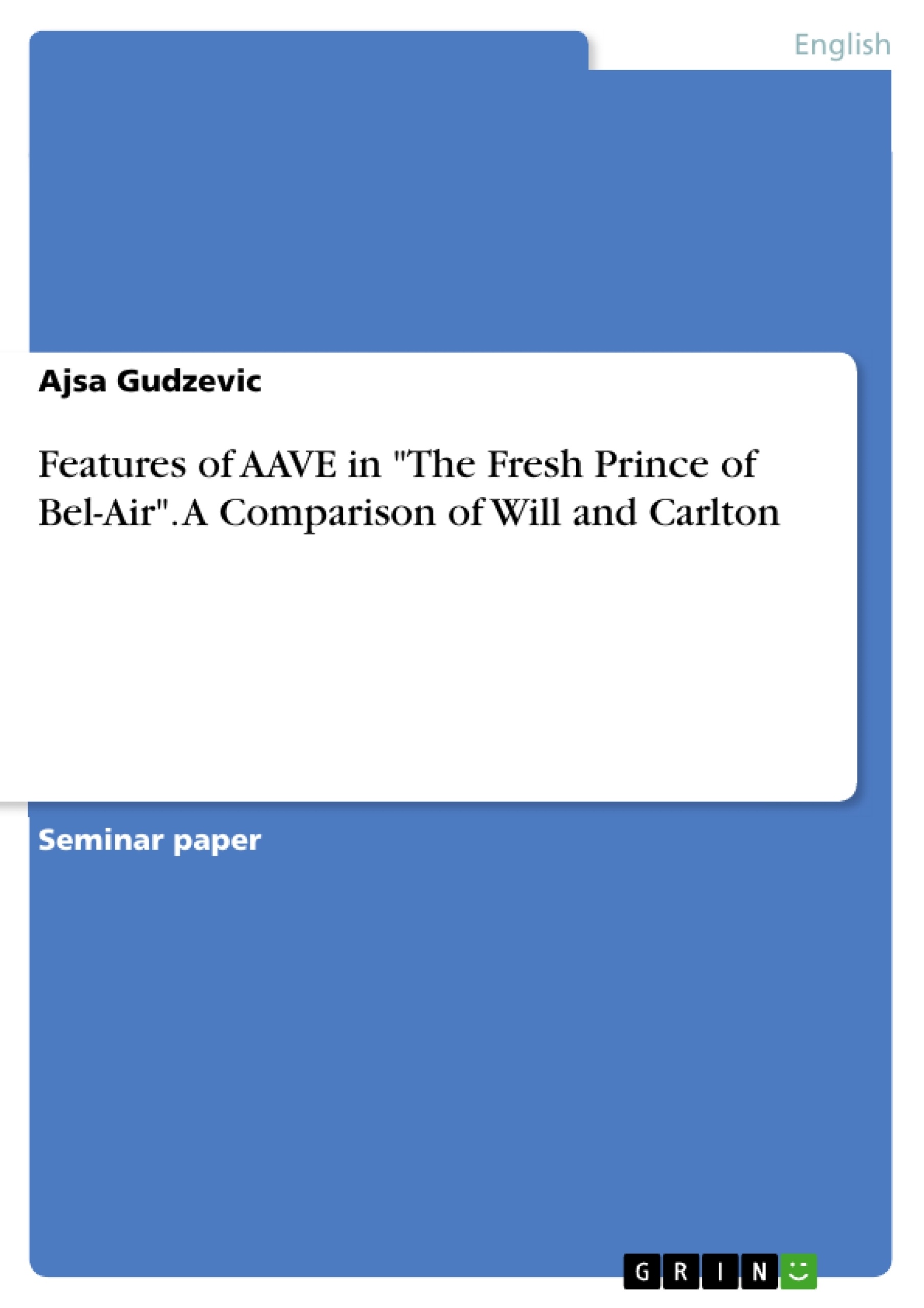This paper discusses the use of African American Vernacular English, or short AAVE, in film and theatre based on the analysis of the TV show The Fresh Prince of Bel-Air. In the last few decades, there has been a growing interest in the research of the African American language and how the idiom can be defined and categorized. Many social linguists suggest different approaches on the matter, for example by doing extensive research on speech patterns and common features for a respective part in the US. Previous studies indicate, that AAVE isn’t an exclusive sociolect to the African American community but rather a concept that is accessible to a variety of different speakers with different backgrounds.
Quiana Lopez and Mary Bucholtz studied the language appropriation by white actors that used AAVE to perform Blackness (2011). Rosalina Lippi-Green was concerned with the reputation of AAVE in films and the social life (2011). However, both studies do not take into account the idea of black actors in a role of an upper-class American falling out of the AAVE stigma and using Standard American English or SAE and in what way it can affect his black identity, which marks the theme of this paper.
This paper proposes a new approach, by analysing the speech patterns of Will, a young African American teenager who was raised in the lower-class and his cousin Carlton who grew up in an African American upper-class family. The aim is to answer what features do Will and Carlton use and how are they linked to their black identity.
The remainder of the paper is organized into sections. Section II mentions the problem of cultural appropriation speakers of AAVE must face in the 21st Century. Afterwards it clarifies the correlation between language and ethnicity.
Section III is devoted to the methodology of this research, i. e. in which way the speech patterns are analysed. The next section reveals the results obtained from the first and 24th episode of the first season of The Fresh Prince of Bel-Air. Section V opens the discussion how one can account for the results and links the results from this paper to the theories of Rosina Lippi-Green and Quiana Lopez.
Inhaltsverzeichnis (Table of Contents)
- Introduction
- AAVE
- Cultural Appropriation in the 21st Century
- Language and ethnicity
- Methodology
- Results: The Prince of Bel-Air
- Episode 1 Season 1
- Episode 24 Season 1
- Discussion
Zielsetzung und Themenschwerpunkte (Objectives and Key Themes)
This paper examines the use of African American Vernacular English (AAVE) in the television show *The Fresh Prince of Bel-Air*, specifically analyzing the speech patterns of Will and Carlton to determine how their use of AAVE relates to their black identity. The study aims to shed light on the impact of social class and cultural context on the language choices of black actors, challenging previous research that focuses solely on the appropriation of AAVE by white actors.
- The use of AAVE as a marker of black identity
- The influence of social class on language use
- Cultural appropriation and the misuse of AAVE
- The intersection of language, ethnicity, and social class
- The impact of media on language use and cultural representation
Zusammenfassung der Kapitel (Chapter Summaries)
- Introduction: This chapter introduces the topic of AAVE in film and theatre, focusing on the analysis of *The Fresh Prince of Bel-Air*. It highlights the growing interest in AAVE research and the need to understand the relationship between language and ethnicity.
- AAVE: This chapter defines AAVE, discussing its features and history. It explores the concept of cultural appropriation in the 21st century and the ways in which AAVE is often misused and misrepresented in popular culture.
- Methodology: This chapter outlines the methodology used to analyze the speech patterns of Will and Carlton. The chapter explains how the researchers chose to analyze the first and 24th episodes of the first season of *The Fresh Prince of Bel-Air* and how they intend to interpret the data.
Schlüsselwörter (Keywords)
This paper explores the complex relationship between language, identity, and social class, focusing on the use of African American Vernacular English (AAVE) as a marker of black identity. Key themes include cultural appropriation, linguistic minstrelsy, the intersection of race and class, and the impact of media on language and cultural representation. The analysis focuses on the speech patterns of Will and Carlton in the television show *The Fresh Prince of Bel-Air*, examining how their use of AAVE reflects their social backgrounds and experiences.
- Citar trabajo
- Ajsa Gudzevic (Autor), 2022, Features of AAVE in "The Fresh Prince of Bel-Air". A Comparison of Will and Carlton, Múnich, GRIN Verlag, https://www.grin.com/document/1244372




